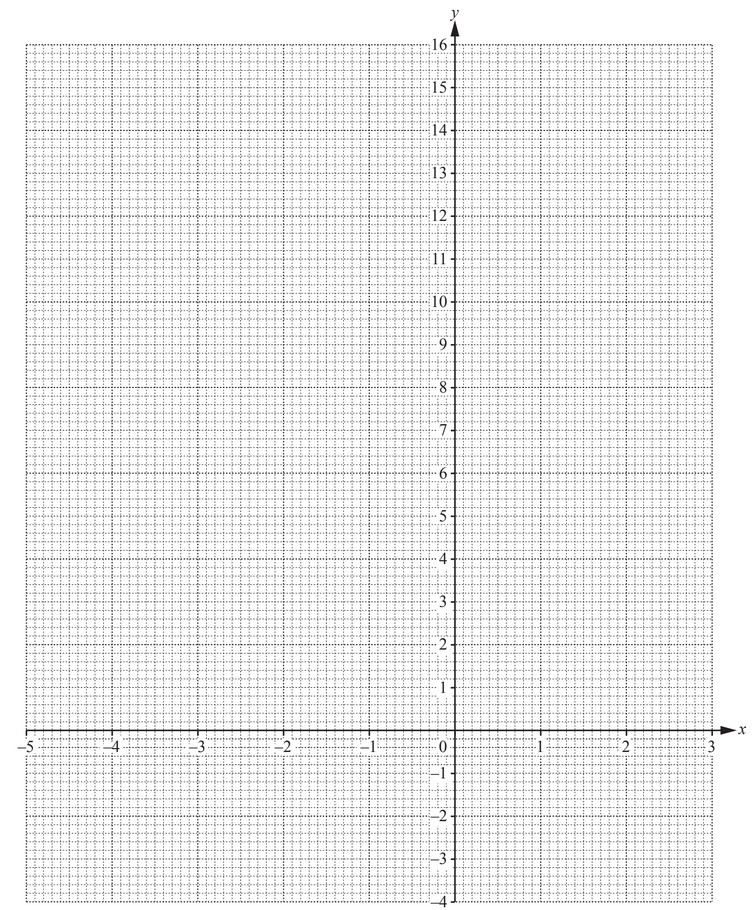(a) Complete the table of values for \(y = x^2 + 2x – 1\).
| x | -5 | -4 | -3 | -2 | -1 | 0 | 1 | 2 | 3 |
| y | 14 | 2 | -1 | -1 | 2 |
(b) On the grid, draw the graph of \(y = x^2 + 2x – 1\) for \(-5 \leq x \leq 3\).

(c) (i) On the grid, draw the line of symmetry.
(ii) Write down the equation of the line of symmetry.
(d) (i) On the grid, plot the points (-5, 7) and (0, -3) and join them with a straight line, L.
(ii) Write down the x co-ordinate of each point where the line L crosses the graph of \(y = x^2 + 2x -1\).
(iii) Work out the gradient of the line L.
▶️ Answer/Explanation
(a) Ans: 7, -2, 7, 14
For \(x = -4\), \(y = (-4)^2 + 2(-4) – 1 = 16 – 8 – 1 = 7\).
For \(x = -1\), \(y = (-1)^2 + 2(-1) – 1 = 1 – 2 – 1 = -2\).
For \(x = 2\), \(y = 2^2 + 2(2) – 1 = 4 + 4 – 1 = 7\).
For \(x = 3\), \(y = 3^2 + 2(3) – 1 = 9 + 6 – 1 = 14\).
(b)
Plot the points from the table and draw a smooth parabola.
(c) (i) & (ii) Ans: x = -1
The line of symmetry is \(x = -1\) (vertex form of a parabola \(y = (x + 1)^2 – 2\)).
(d) (i)
Draw a straight line through (-5, 7) and (0, -3).
(ii) Ans: x ≈ -3.4, x ≈ -0.6
Solve \(x^2 + 2x – 1 = -2x – 3\) → \(x^2 + 4x + 2 = 0\). Using the quadratic formula, \(x \approx -3.4\) and \(x \approx -0.6\).
(iii) Ans: -2
Gradient \(m = \frac{-3 – 7}{0 – (-5)} = \frac{-10}{5} = -2\).
(a) (i) Complete the table of values for \( y = \frac{8}{x}, x \neq 0 \).
| x | -8 | -4 | -2 | -1 | 1 | 2 | 4 | 8 |
| y | -1 | -2 | -4 | -8 | 8 | 4 | 2 | 1 |
(ii) On the grid, draw the graph of \( y = \frac{8}{x} \) for \( -8 \leq x \leq -1 \) and \( 1 \leq x \leq 8 \).

(iii) Write down the order of rotational symmetry of your graph.
(b) (i) Complete this table of values for \( y = 1.5x + 3 \).
| x | -4 | -2 | 0 | 2 |
| y | -3 | 0 | 3 | 6 |
(ii) On the grid, draw the graph of \( y = 1.5x + 3 \).
(c) Use your graphs to solve the equation \( \frac{8}{x} = 1.5x + 3 \).
(d) Write down the gradient of the graph of \( y = 1.5x + 3 \).
▶️ Answer/Explanation
(a) (i) Ans: See table above.
For each \( x \), compute \( y = \frac{8}{x} \). Example: When \( x = -8 \), \( y = \frac{8}{-8} = -1 \). Similarly, fill all missing values.
(ii) Ans: 8 points correctly plotted, 2 smooth curves (not joined).
Plot the points from the table. The graph consists of two hyperbola branches in quadrants II and IV.
(iii) Ans: 2.
The graph has 180° rotational symmetry about the origin (order 2).
(b) (i) Ans: See table above.
Substitute \( x \) into \( y = 1.5x + 3 \). Example: When \( x = -2 \), \( y = 1.5(-2) + 3 = 0 \).
(ii) Ans: Correct straight line.
Plot the points and draw a straight line through them.
(c) Ans: \( 1.4 \) to \( 1.6 \) and \( -3.6 \) to \( -3.4 \).
Find the \( x \)-coordinates where the hyperbola and line intersect.
(d) Ans: \( 1.5 \).
The gradient is the coefficient of \( x \) in \( y = 1.5x + 3 \).
